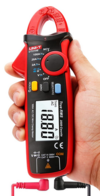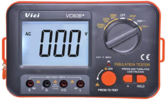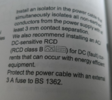I have to agree with
@JohnW2 there is no reason I can think of why any RCD should trip when items turned off with a single phase supply.
However neither can I see any reason why turning MCB's on one at a time does not trip the RCD, but turning all on together i.e. using isolator the RCD trips, but I know this does happen.
I blamed spikes on the supply, for many of my RCD trips, as could not find any leakage testing with an insulation tester, I do intend to buy one of these

which on the 2 amp AC range will show 1 mA so can actually measure the leakage, but even this cheap model costs around £40, the same with one of these

at £32 even the cheap testers cost a lot of money, lucky I have a couple of insulation testers, but without them the DIY guy is unlikely to find the fault. And even with an insulation tester I failed to find out why my RCD would every so often trip, so on moving I went all RCBO's. Not sure that helps, as when they do trip no idea if due to overload or earth leakage.
I know you have said your RCD's have only tripped with a known fault, but mine would trip maybe 5 times in two weeks, then without doing anything to cure the problem, would go for 2 years without tripping, when my daughter got rid of a boy friend some 20 years ago, the number of trips reduced, seems likely some thing to do with his PC's.
But my RCD's were fitted in the 90's, they were 4 module wide, and before we used electronics in them. No marking for type AC, A, F, or B, we had only just got rid of the ELCB-v type, all it says is 30 mA. It passed with a ½ leakage test, but two identical units, one would allow the use of my loop impedance tester (Non RCD trip type) but other would always trip.
I did consider changing the RCD these were allowed in domestic [GALLERY=media, 6704][/GALLERY] at the time, auto resetting, darn expensive, but did consider fitting one. Now not permitted in domestic, but the X-pole RCD was claimed to only trip 80 - 100% rather than 50 - 100% and was claimed less likely to nuisance trip, and when we first started fitting 30 mA rather than 100 mA RCD's nuisance tripping was a problem.
But RCD's have got better over the years, also things like filtered sockets and power supplies no longer leak to earth, early days of PAT testing many items failed on the earth leakage test.
We tend to consider our own situation, in my case a TN-C-S supply, so neutral it tied to earth potential, with a TT supply likely different as to what faults will trip a RCD, and of course how important the RCD is, with a TN-C-S supply the RCD is secondary protection and I am not worried that all mine at type AC, but if I was on a TT supply would want to change them.
On another site some one posted this

set of instructions for a boiler, first time I have seen type B RCD recommended for a boiler, seems it is a "Veissman, vitodens 100-w" but with my make of consumer unit I could not fit a type B even if I wanted to, can't get single module width RCBO's type B although they did say type B on the packet, but turned out to be curve B type AC.
I am not convinced that type AC will fail to trip, and that 6 mA detectors for DC are really required, however it is clear the RCD's on the market today are very different to those of 1992 when I first fitted them, and we have no idea of the age of the RCD in question, or what faults if any the oven has.
However since test gear costs so much, and using it can cause danger, likely the best option is get some one with the gear to test it, and see what the fault is.




